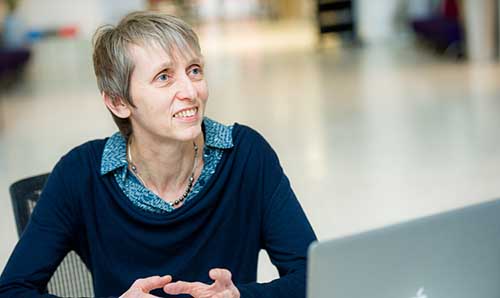Julie Froud
Professor of Financial Innovation

Throughout her career Julie has worked in areas that touch closely on the policy world and her research has had proven impact. In particular she has been involved for the last ten years in studying the ‘foundational' economy in the UK, researching the essential but often overlooked parts of the economy such as food, transport and housing. The foundational economy provides more than 40% of the jobs in the UK but has not received an equivalent amount of attention from policy makers.
As she says: "Government initiatives such as the Industrial Strategy have tended to focus on the perceived exciting new industries rather than on these mundane sectors. But we need to better understand the economy that we already have and how these systems can be developed to better meet the needs of citizens, especially given the nature and climate emergencies."
Julie says she is motivated by wanting to better understand the importance of the foundational economy and, just as critically, how it can be remade.
"This means thinking deeply about two things. Firstly, analysing the systems that drive these sectors, and secondly thinking about how this interconnects with place. You have to think about both together."
Impact
In terms of impact, working with colleagues her research on the foundational economy has, for instance, helped to re-focus Welsh Government policy and practice to recognise the provision of essential services provided by local firms.
Over the last few years the Welsh Government has increasingly acknowledged the foundational economy and begun to develop its own approaches on policy interventions and good practice, and promoted non-government initiatives that put into action foundational economy principles.
She says the impact work she has been involved with in Wales has highlighted the challenges of changing the focus of policies.
"For example, policy on towns has tended to focus on town centres with financial supported directed to stand alone projects. Following a research report that analysed three Welsh towns, policy is now recognising the need to understand how people live, work and travel in and around towns, including the problem of out of town retail. Regeneration of towns needs planning reform but also needs policies on housing and transport brought together with public services."
Levelling up
In relation to the big challenge of levelling up and how this is relevant to the foundational economy, Julie adds: "Firstly, there is the ‘what' question. For instance, most people agree that for levelling up to be successful then the centralisation of the UK economy has to be reversed in a significant way through both the devolution of financial resources and power. But what does this mean for specific foundational economy sectors, especially transport and housing?"
"And secondly there is the ‘who' question. How do you actually get things done? In this respect there is increasing agreement that there is a limit to what the government can do on its own because of a limit to what it directly controls and because of the need to more directly involve civil society organisations and communities."
"For instance, if you take the housing sector, then much of the social housing is managed by housing associations which have become key social and economic actors. The more progressive housing associations are seeing that their role needs to be broadened to better support their tenants with employability, food and health. So how can government work with these and other actors?"
Community study
Another area of focus for Julie is how communities can have more control over their own economic destinies. A good example is a community study that Julie was involved with in the Welsh town of Blaenau Ffestiniog, a deindustrialised community right in the heart of Snowdonia.
As she explains: "The local economy is partly being remade through an amazing group of social enterprises in areas such as care, arts and culture, outdoor sports, and leisure. What is striking is how these organisations combine a focus on economic and community impact. They are looking at how they can take control of the local economy and make it sustainable so that it's a place where people can live and work."
"They also see that there is a limit to what a community can do for itself and that they need to work with others. This might include the local authority and larger employers in order to strengthen some areas of the foundational economy such as housing and transport. This work brings together many of the themes that drive my research and the bridge between policy, place and the real-world economy."
